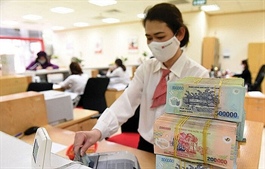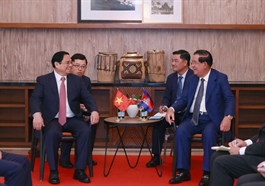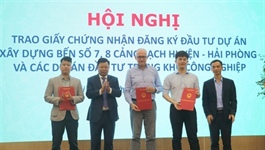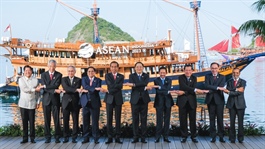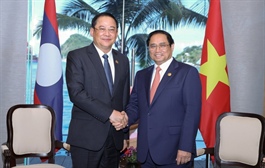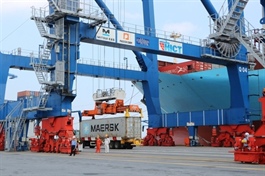Vietnam is one of the most attractive destinations for Asia-to-Asia investment flows
Vietnam is one of the most attractive destinations for Asia-to-Asia investment flows
Citi's newly appointed Asia-Pacific head of Global Network Banking (GNB) Stella Choe shared her views on Vietnam with VIR and why the country is a key market for Citi globally.
How will your business support clients in Vietnam even more with their banking needs?
Global network banking brings together corporate and commercial bankers into one team focused on supporting clients across Citi’s global network.
This model expands Citi’s network coverage capabilities and enables Citi Commercial Bank clients to enjoy the full power of Citi’s global, regional, and local footprint, which has been fundamental to our long-term success with large multinational corporates.
In Vietnam, our banking business has strong growth prospects and the combination will help us to capture a great share of the increasing flows from multinational companies who are increasingly looking to Vietnam for supply chain resilience. Also, we can support our local clients across Citi’s global network.
Whether clients come to us for working capital or funding, or treasury, risk management or investment banking solutions, our network enables both fast-growing, mid-corporates and large, established multinational corporations to grow to their true potential.
Vietnam is a key market in your Asia-to-Asia corridor strategy. What growth are you seeing in corridors that involve Vietnam, and with which products?
Vietnam has enhanced its supply chain ecosystem and is one of the most attractive destinations for Asia-to-Asia investment flows in ASEAN.
The nation’s advantages include its flexible and skilled labour, its strategic position in the centre of Southeast Asia, its proximity to China (the world’s second-biggest economy), its young and well-educated population, and a government that prioritises improving business policies, labour laws, and incentivising infrastructure investment.
Production and manufacturing – in which cost control is indispensable – is the biggest segment to attract foreign direct investment (FDI) flows. Many original design manufacturers and electronics manufacturing service providers have partially moved their production lines to Vietnam. Consumer, home care, and healthcare is also an important segment receiving investment flows thanks to increasing demand, both locally and from ASEAN generally.
Citi has been working with multinational clients, advising them on supply chain management and providing them with relevant cash management, liquidity, and financing solutions to manage the current market uncertainties.
How is Citi boosting FDI into the country?
With a presence in 95 markets, Citi can leverage from its network with multinational corporations all around the world to promote the competitive advantages and capabilities of Vietnam.
With our local market expertise, Citi can provide intelligence, market research, due diligence, regulatory updates, and investment opportunities to foreign investors to keep them informed and support their investment decisions.
For investors who are looking to invest in Vietnam, Citi can provide financing options, investment advisory, risk management, and other banking solutions to facilitate their business flows into the nation.
As more multinational clients invest in Vietnam, Citi’s priority is to support these flows and facilitate their growth. Citi serves the biggest FDI client portfolio of Fortune 500 companies and facilitates annual international trade flows exceeding $90 billion into Vietnam.
We are also intently focused on supporting sustainability in the country, especially in areas such as social finance, where we have a long history.
Citi recently released its 2022 environmental, social, and governance (ESG) report, highlighting progress across the business and its foundation towards building more sustainable, diverse, and equitable communities around the world. This annual report provides additional information on the performance and management of Citi’s commitments to address environmental and social priorities while building long-term value for its stakeholders.
Through our $1 trillion Sustainable Finance Goal, Citi is facilitating a wide range of activities from renewable energy and clean technology to healthcare and affordable housing. From 2020 through 2022, Citi has financed and facilitated a total of $348.5 billion in sustainable finance activity globally.
Citi is already an established market leader in Vietnam with ESG at the core of its business, and we are keen to work more to find innovative solutions, including green financing and blended finance models, that can support the government’s National Green Growth Strategy.
In 2022, Citi signed an MoU for cooperation on the ESG agenda towards meeting the net-zero carbon emission targets with the Vietnamese Ministry of Natural Resources and Environment. Citi closed the very first voluntary carbon credit (VCC) transaction in late May 2022 as the offtaker to buy VCCs from a project developer who manufactures and distributes improved cook stoves and water purifiers to low-income rural communities in Vietnam.
In Feb 2023, Citi acted as an arranger and structurer on an emission reduction-linked bond with the World Bank. The Water Purifiers for Schools project will enable access to clean drinking water for 2 million children.
Citi has a strong digital offering for corporate clients. Why is that important?
The digitalisation of the global economy has transformed banking. Clients want a banking experience that is both as easy and as enjoyable as their digital consumer lives. They want connectivity so they can integrate their companies into ours to directly leverage our capabilities.
So, the scale and speed required to serve our clients is of a completely different magnitude. We are now living in a world of digital platforms.
At Citi we have embraced and responded to that challenge. Last year, we spent $10 billion on technology, and this year, we've budgeted approximately $11 billion, which is a 30 per cent increase compared to 2020. That spend is split roughly equally between changing the bank and running its activities. We've also increased our technology headcount by over 30 per cent during that time, and that's been in a very competitive talent market. We now have over 30,000 software engineers.
Furthermore, we move over $4 trillion globally each day across the 160 different markets where we support clients, with an on the ground presence in 95 of them and direct connectivity in almost every major clearing system.
We have the largest proprietary payment network in the industry. This network connects into almost 270 transfer systems worldwide, which is the last mile of our payment network. We thus have a deep appreciation for scale and agility.
As we expand our network to include alternate payment methods, like mobile wallets and local instant payment schemes, we are enabling our clients to make payments as if there are no borders, currencies, or constraints.
Here in Vietnam, after the launch of the CitiDirect BE Document Centre and digital onboarding, Citi Vietnam Treasury and Trade Solutions announced a strategic partnership with Vietnam-based intermediary payment service providers to facilitate consumer-to-business collections for corporate clients in the country. Citi Vietnam is also now launching Napas instant payments and collections for our corporate clients here.




